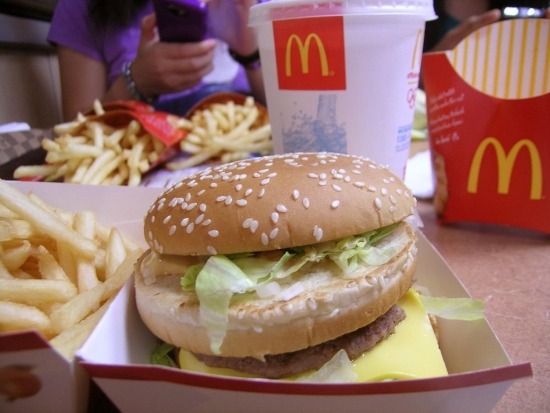Fast food is a huge international industry, with consumers spending billions of pounds annually on burgers, fries and kebabs. One of the iconic groups in this sector is McDonald’s, which continues to expand year upon year as increasing numbers of countries open their doors to the American chain.

However, with the focus of many Western societies turning to the obesity epidemic rapidly spreading through North America and Europe, perhaps consumer taste for the popular chain’s fare is beginning to drop. Documentaries such as Morgan Spurlock’s “Supersize Me” opened the eyes of consumers as to what is actually going into their burgers, and the effects these products can have on their bodies.
Still, it has come of something of a shock that McDonald’s has posted its first drop in monthly revenues in almost a decade, especially as the fast food restaurant chain was one of the top official sponsors for the London 2012 Olympics. A massive boost in advertising, as well as the opening of the group’s largest outlet in the Olympic Park made many speculators believe that this year would be McDonald’s most successful yet.
The Group announced that global sales fell by 1.8 per cent during October, based on figures from restaurants which had been operational for a minimum of 13 months. As the drop is calculated based on monthly revenues, it is not certain what effect this announcement will have on the final annual results for the chain.
Monthly revenues calculation is the best measure of performance in fast food restaurants, as it allows for a more accurate judgement without the figures pertaining to expansion clouding the results. Additionally, as so many of the restaurants in the chain are not directly operated by the company – instead being franchised under the McDonald’s brand – examining performance on a month by month basis is a lot simpler.
The first drop in monthly revenues since March 2003 has been blamed on a slowing consumer demand by chief executive Don Thompson. He claimed that the worldwide financial instability has dampened customers’ hunger for fast food, with many choosing cheaper brands in order to keep costs down.
Competition will also be playing a large role in many of McDonald’s traditional strong markets, with chains such as Burger King, Taco Bell and Wendy’s all beginning to expand in America. In Britain, meanwhile, brands such as KFC and Pizza Hut are beginning to grow in popularity – possibly enough to knock McDonald’s off its pedestal as the UK’s favourite fast food chain.
Yet healthier brands are also beginning to attract a growing number of consumers through their doors, possibly due to a higher than ever emphasis being put on the dangers of obesity and heart disease as a result of diet. Subway is becoming increasingly popular in the UK, with the majority of towns and cities in this country now home to at least one branch.
Mr Thompson did not let the poor results faze him, however, and has stated that McDonald’s will now shift the focus onto expanding their menu options and lowering prices using the “dollar menu” which has proven popular in the United States.
He said; “I am confident that our strategies and the adjustments we are making in response to the current business headwinds will build sales momentum and drive sustained, profitable growth.”
The drop in revenues was largely an international phenomenon, with the US and European sectors of the group posting a 2.2 per cent sales slump and Asia, Africa and the Middle East down by 2.4 per cent. Perhaps this is an indication that the fast food industry is changing intrinsically, with consumers now craving healthier and more fulfilling meals for their money – or perhaps McDonald’s has simply had its time in the sun, and a close rival will be the next to rise to the top of the fast food chain.
Either way, this international plunge in popularity certainly indicates one thing – despite what McDonald’s continue to insist in their advertising campaigns, for one reason or another, consumers are no longer “lovin’ it.”
Do you think that a drop in revenues for McDonald’s is a positive sign in the battle against obesity, or do you simply think that consumers have migrated to a different chain such as Wendy’s or Burger King? Should healthier fast food chains be promoted more – perhaps through sporting events such as the Olympic Games – to encourage healthy eating in the public domain?